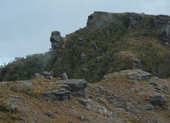
Al Morrison, the director general of New Zealand’s Department of Conservation — the government body that manages about one-third of the country’s land area, from World Heritage temperate rainforest in the south to kauri forests in the north (not to mention running world-class efforts to conserve endangered native species such as the kakapo and tuatara) — gave a remarkable speech to Lincoln University last week. It was brave, far-sighted and touched so many right notes that it brought a bright little melody to my weekend reading.
Morrison was giving the university’s 12th annual State of the Nation’s Environment Address, and took the opportunity to discuss the pursuit of economic growth above all else in a country where conservation is a major contributor to that economy. Here are some of the highlights, but the whole thing is well worth a read:
Morrison considers the message from the Millenium Ecosystem Assessment:
We are degrading ecosystems and destroying species to a point where the services that nature provides, that we rely on for our sustenance, and that determine our prosperity, are being run down and out.
If we are to save ourselves from ourselves, then appealing to the intrinsic value of nature is not enough. It is not a matter of giving up that sense of awesome wonder, but rather adding to that, an argument designed to compel the uncommitted.
He explores the case for business to play a role in conservation in its widest sense.
It may seem crass to say that climate change and it’s big cousin, biodiversity loss, create a potential competitive advantage for New Zealand. But connecting the ethics and the self-interest; intrinsic value and economic benefits, helps us better understand that sustainable management of natural resources is not just about nice things to do when time and discretionary resources are available.
It is a necessary investment in the natural capital that sits at the base of our economy. Water, soil, air, nutrient cycles, climate regulation, pollination…these and other services are the natural capital we need to survive and prosper. That reality turns on its head the received wisdom that only rich counties can afford clean environments.
The way we measure economic progress is broken:
When the current recession revealed a collapsing financial system, some 12 trillion dollars was found in quick time across the globe to prop it up. But when nations met at Copenhagen to try and restore a collapsing environmental system, the cupboard was apparently all but bare.
Therein lies the nub of the problem.
The way we conventionally describe and measure economic progress is an incentive to ignore the impacts of unsustainable natural resource use and management, and capture the benefits and subsidies from that with a clear conscience.
We need to move beyond GDP as the measure of the real economy, and beyond growth as the only goal:
If GDP is failing as a measure of environmental sustainability then surely that is a powerful incentive to find a new construct that measures true progress.
It is no easy task to build one. First base is to balance economic, social and environmental considerations and reach a pragmatic compromise. But that’s far from a home run. Living in harmony with nature’s systems; living sustainably, is not apart from the economy, it is a key component of it. Nature’s systems lie at the base of any economy. If they are not functioning efficiently, then the economy cannot function efficiently. If we destroy them, we destroy the economy.
So like or not, our future is inextricably linked to how we tread on our land and oceans, and manage the natural resources that are the key to our surviving and thriving.
And finally:
But there is a lot of work to do to make this a prosperous path for New Zealand. It will require radical change in public policy and management, economic thinking, and business practice. I see enough activity to make me optimistic, but no real sense of urgency. We are still gambling with nature’s tolerance.
It was a brave speech by a senior civil servant who reports to a government committed to growing New Zealand’s by all means possible — including more exploration for oil and mineral resources in the conservation estate. It shows an awareness of the real issues that confront New Zealand and the world, something that seems to be all too uncommon in government anywhere. If you read nothing else today, read Morrison’s speech.
Morrison quoted poet Brian Turner at the beginning of his address, but the Otago poet’s words also make a fitting conclusion.
Under Mt St Bathans
There is majesty in the mass
Light moves, tints the snow;
The wind shakes the sparse grasses;
Water runs, stones rattle unexpectedly
And the land speaks;
None of us are greatly different,
We’re ordinary more than extraordinary
Most of the time. And if there’s one word
For what the sun highlights on the hills,
One word that we should apprehend
And make our own, it is
Decency: and, what’s ever implacable,
And what stone has irreducibly,
Dignity
From: Into The Wider World by Brian Turner
For some reactions to Morrison’s speech, see this piece by David Williams in The Press.
Like this:
Like Loading...
 A recent Forest and Bird Newsletter contrasted the anticipated loss of 100 jobs in the Department of Conservation with the announced doubling of the number of people employed in the Ministry of Economic Development’s unit aimed at expanding the oil and minerals industries. The newsletter comments that some of those who will lose their jobs with DOC are expected to be people with strong scientific and technical experience who know what would be lost if mining or other destructive developments were to take place on conservation land.
A recent Forest and Bird Newsletter contrasted the anticipated loss of 100 jobs in the Department of Conservation with the announced doubling of the number of people employed in the Ministry of Economic Development’s unit aimed at expanding the oil and minerals industries. The newsletter comments that some of those who will lose their jobs with DOC are expected to be people with strong scientific and technical experience who know what would be lost if mining or other destructive developments were to take place on conservation land.

